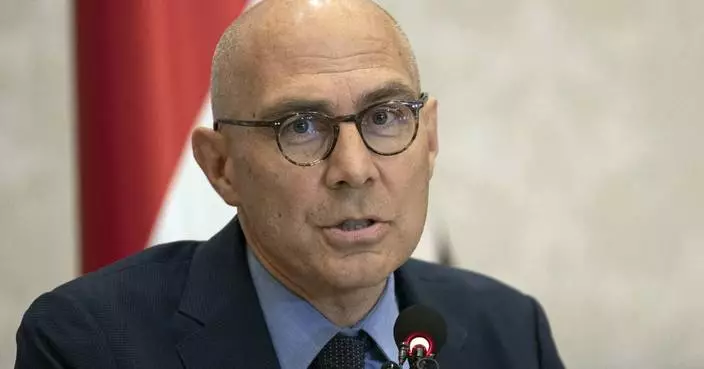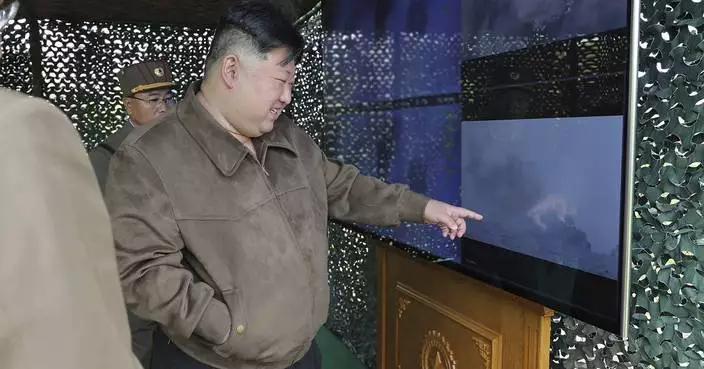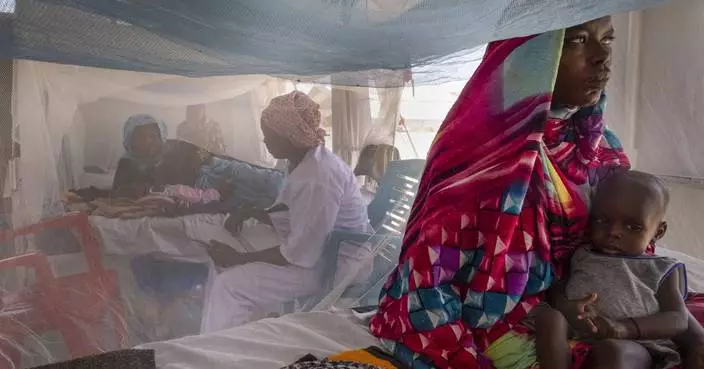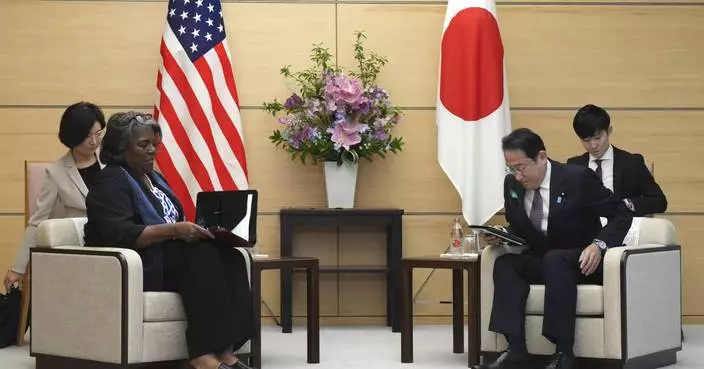The U.N. secretary-general and the Singaporean foreign minister voiced concerns about global trade tensions and rising protectionism during back-to-back meetings in Beijing on Sunday.
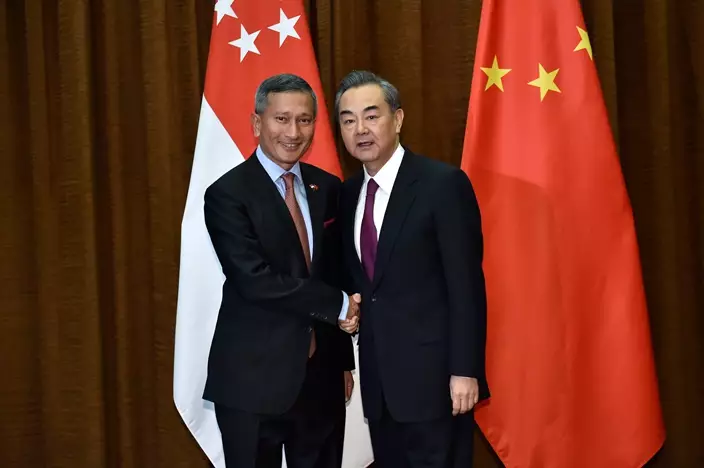
Singapore's Foreign Minister Vivian Balakrishan, left, shakes hands with Chinese Foreign Minster and State Counselor Wang Yi before their meeting Sunday, April 8, 2018 at the Ministry of Foreign Affairs in Beijing, China. (Parker Song/Pool Photo via AP)
Following remarks from his Chinese counterpart, Singaporean Foreign Minister Vivian Balakrishnan vowed to "double-down" on free trade and economic liberalization in tandem with China.
Click to Gallery
The U.N. secretary-general and the Singaporean foreign minister voiced concerns about global trade tensions and rising protectionism during back-to-back meetings in Beijing on Sunday.
Following remarks from his Chinese counterpart, Singaporean Foreign Minister Vivian Balakrishnan vowed to "double-down" on free trade and economic liberalization in tandem with China.
"You mentioned reform and opening up - it's so important in a moment when some others have a policy of closing up," Guterres told Chinese Foreign Minister Wang Yi.
Beijing vowed Friday to "counterattack with great strength" if President Donald Trump follows through on threats to impose tariffs on an additional $100 billion in Chinese goods.
The U.S. bought more than $500 billion in goods from China last year and now is planning or considering penalties on some $150 billion of those imports. The U.S. sold about $130 billion in goods to China in 2017 and faces a potentially devastating hit to its market there if China responds in kind.
"This is a time in the world where the temptation to embark on unilateralism and protectionism is unfortunately rising," Balakrishnan said.
In a separate meeting, Secretary-General Antonio Guterres called China "absolutely crucial" in the international system.
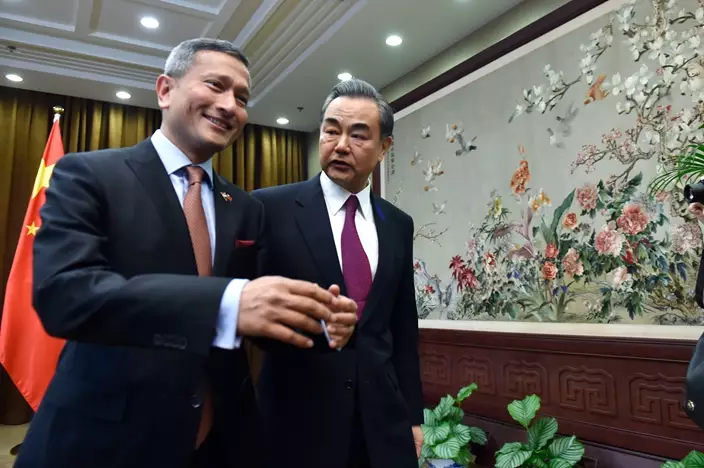
Singapore's Foreign Minister Vivian Balakrishan, left, talks with Chinese Foreign Minster and State Counselor Wang Yi before their meeting Sunday, April 8, 2018 at the Ministry of Foreign Affairs in Beijing, China. (Parker Song/Pool Photo via AP)
"You mentioned reform and opening up - it's so important in a moment when some others have a policy of closing up," Guterres told Chinese Foreign Minister Wang Yi.
"The solutions for these problems are not to put globalization to question, but to improve globalization. Not isolation or protectionism, but more international cooperation," Guterres said.
The comments came as China and the U.S. exchanged escalating tariff threats in what is already shaping up to be the biggest trade battle for more than a half century.
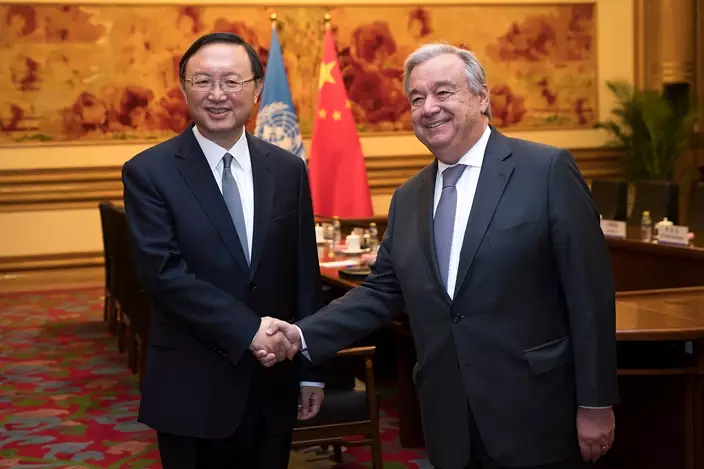
Yang Jiechi, left, a member of the Political Bureau of CPC Central Committee and head of the General Office of the Central Committee for Foreign Affairs, shakes hands with United Nations Secretary General Antonio Guterres, right, at Zhongnanhai Sunday, April 8, 2018 in Beijing, China. (Lintao Zhang/Pool Photo via AP)
Beijing vowed Friday to "counterattack with great strength" if President Donald Trump follows through on threats to impose tariffs on an additional $100 billion in Chinese goods.
Trump's announcement followed China's decision to tax $50 billion in American products, including soybeans and small aircraft, in response to a U.S. move this week to impose tariffs on $50 billion in Chinese goods.
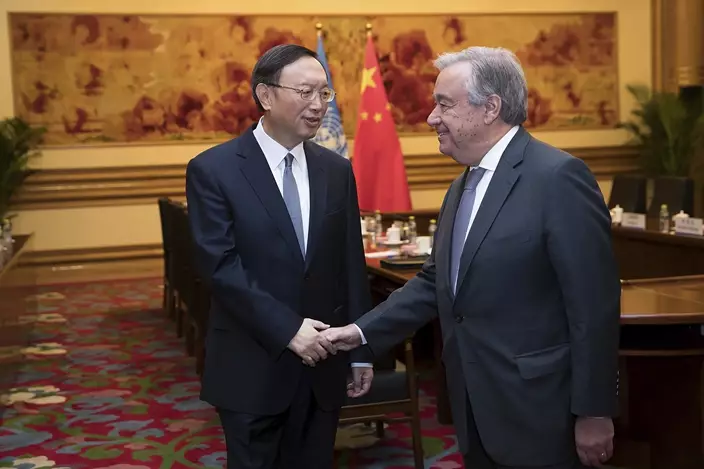
Yang Jiechi, left, a member of the Political Bureau of CPC Central Committee and head of the General Office of the Central Committee for Foreign Affairs, shakes hands with United Nations Secretary General Antonio Guterres, right, at Zhongnanhai Sunday, April 8, 2018 in Beijing, China. (Lintao Zhang/Pool Photo via AP)
The U.S. bought more than $500 billion in goods from China last year and now is planning or considering penalties on some $150 billion of those imports. The U.S. sold about $130 billion in goods to China in 2017 and faces a potentially devastating hit to its market there if China responds in kind.
In the meetings, Wang attacked what he called "protectionism and unilateralism," though he didn't single out the U.S. by name.
"China will safeguard the principles of free trade and oppose protectionism," Wang said. "We should push forward with economic globalization."
Wang was welcoming both officials ahead of their planned appearances at the annual Boao Forum for Asia, a Chinese-sponsored annual gathering for political and economic elites on tropical Hainan Island.
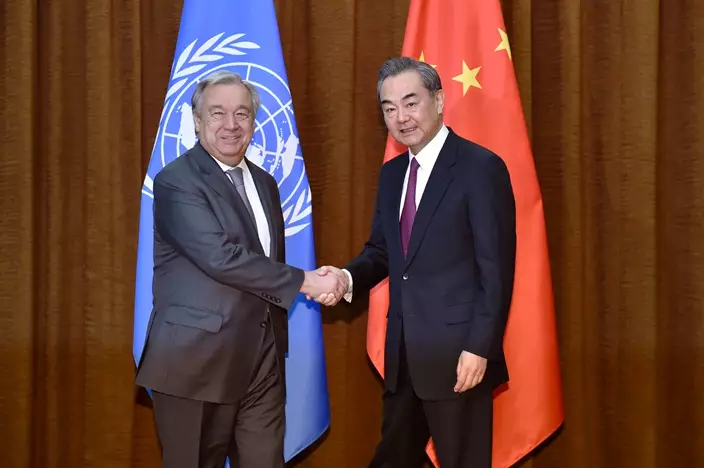
U.N. Secretary-General Antonio Guterres, left, shakes hands with Chinese Foreign Minster and State Counselor Wang Yi before their meeting Sunday, April 8, 2018 at the Ministry of Foreign Affairs in Beijing, China. (Parker Song/Pool Photo via AP)
Guterres will meet President Xi Jinping later Sunday and also plans to visit the China Peacekeeping Police Training Center.
Balakrishnan is traveling with Singaporean Prime Minister Lee Hsien Loong on the first of a five-day visit to China.
UNITED NATIONS (AP) — Russia on Wednesday vetoed a U.N. resolution sponsored by the United States and Japan calling on all nations to prevent a dangerous nuclear arms race in outer space, calling it “a dirty spectacle” that cherry picks weapons of mass destruction from all other weapons that should also be banned.
The vote in the 15-member Security Council was 13 in favor, Russia opposed and China abstaining.
The resolution would have called on all countries not to develop or deploy nuclear arms or other weapons of mass destruction in space, as banned under a 1967 international treaty that included the U.S. and Russia, and to agree to the need to verify compliance.
U.S. Ambassador Linda Thomas-Greenfield said after the vote that Russian President Vladimir Putin has said Moscow has no intention of deploying nuclear weapons in space.
“Today’s veto begs the question: Why? Why, if you are following the rules, would you not support a resolution that reaffirms them? What could you possibly be hiding,” she asked. “It’s baffling. And it’s a shame.”
Russia’s U.N. Ambassador Vassily Nebenzia dismissed the resolution as “absolutely absurd and politicized,” and said it didn’t go far enough in banning all types of weapons in space.
Russia and China proposed an amendment to the U.S.-Japan draft that would call on all countries, especially those with major space capabilities, “to prevent for all time the placement of weapons in outer space, and the threat of use of force in outer spaces.”
The vote was 7 countries in favor, 7 against, and one abstention and the amendment was defeated because it failed to get the minimum 9 “yes” votes required for adoption.
The U.S. opposed the amendment, and after the vote Nebenzia addressed the U.S. ambassador saying: “We want a ban on the placement of weapons of any kind in outer space, not just WMDs (weapons of mass destruction). But you don’t want that. And let me ask you that very same question. Why?”
He said much of the U.S. and Japan’s actions become clear “if we recall that the U.S. and their allies announced some time ago plans to place weapons … in outer space.”
Nebenzia accused the U.S. of blocking a Russian-Chinese proposal since 2008 for a treaty against putting weapons in outer space.
Thomas-Greenfield accused Russia of undermining global treaties to prevent the spread of nuclear weapons, irresponsibly invoking “dangerous nuclear rhetoric,” walking away from several of its arms control obligations, and refusing to engage “in substantive discussions around arms control or risk reduction.”
She called Wednesday’s vote “a real missed opportunity to rebuild much-needed trust in existing arms control obligations.”
Thomas-Greenfield’s announcement of the resolution on March 18 followed White House confirmation in February that Russia has obtained a “troubling” anti-satellite weapon capability, although such a weapon is not operational yet.
Putin declared later that Moscow has no intention of deploying nuclear weapons in space, claiming that the country has only developed space capabilities similar to those of the U.S.
Thomas-Greenfield said before the vote that the world is just beginning to understand “the catastrophic ramifications of a nuclear explosion in space.”
It could destroy “thousands of satellites operated by countries and companies around the world — and wipe out the vital communications, scientific, meteorological, agricultural, commercial, and national security services we all depend on,” she said.
The defeated draft resolution said “the prevention of an arms race in outer space would avert a grave danger for international peace and security.” It would have urged all countries carrying out activities in exploring and using outer space to comply with international law and the U.N. Charter.
The draft would have affirmed that countries that ratified the 1967 Outer Space Treaty must comply with their obligations not to put in orbit around the Earth “any objects” with weapons of mass destruction, or install them “on celestial bodies, or station such weapons in outer space.”
The treaty, ratified by some 114 countries, including the U.S. and Russia, prohibits the deployment of “nuclear weapons or any other kinds of weapons of mass destruction” in orbit or the stationing of “weapons in outer space in any other manner.”
The draft resolution emphasized “the necessity of further measures, including political commitments and legally binding instruments, with appropriate and effective provisions for verification, to prevent an arms race in outer space in all its aspects.”
It reiterated that the U.N. Conference on Disarmament, based in Geneva, has the primary responsibility to negotiate agreements on preventing an arms race in outer space.
The 65-nation body has achieved few results and has largely devolved into a venue for countries to voice criticism of others’ weapons programs or defend their own. The draft resolution would have urged the conference “to adopt and implement a balanced and comprehensive program of work.”
At the March council meeting where the U.S.-Japan initiative was launched, U.N. Secretary-General António Guterres warned that “geopolitical tensions and mistrust have escalated the risk of nuclear warfare to its highest point in decades.”
He said the movie “Oppenheimer” about Robert Oppenheimer, who directed the U.S. project during World War II that developed the atomic bomb, “brought the harsh reality of nuclear doomsday to vivid life for millions around the world.”
“Humanity cannot survive a sequel to Oppenheimer,” the U.N. chief said.

United States Ambassador and Representative to the United Nations Linda Thomas-Greenfield addresses members of the U.N. Security Council before voting during a meeting on Non-proliferation of nuclear weapons, Wednesday, April 24, 2024 at United Nations headquarters. (AP Photo/Eduardo Munoz Alvarez)

FILE - U.S. Ambassador to United Nations Linda Thomas-Greenfield speaks on Thursday, April 18, 2024, in Tokyo. The U.N. Security Council is set to vote Wednesday, April 24, 2024, on a resolution announced by Thomas-Greenfield, calling on all nations to prevent a dangerous nuclear arms race in outer space. It is likely to be vetoed by Russia. (AP Photo/Eugene Hoshiko, Pool, File)










